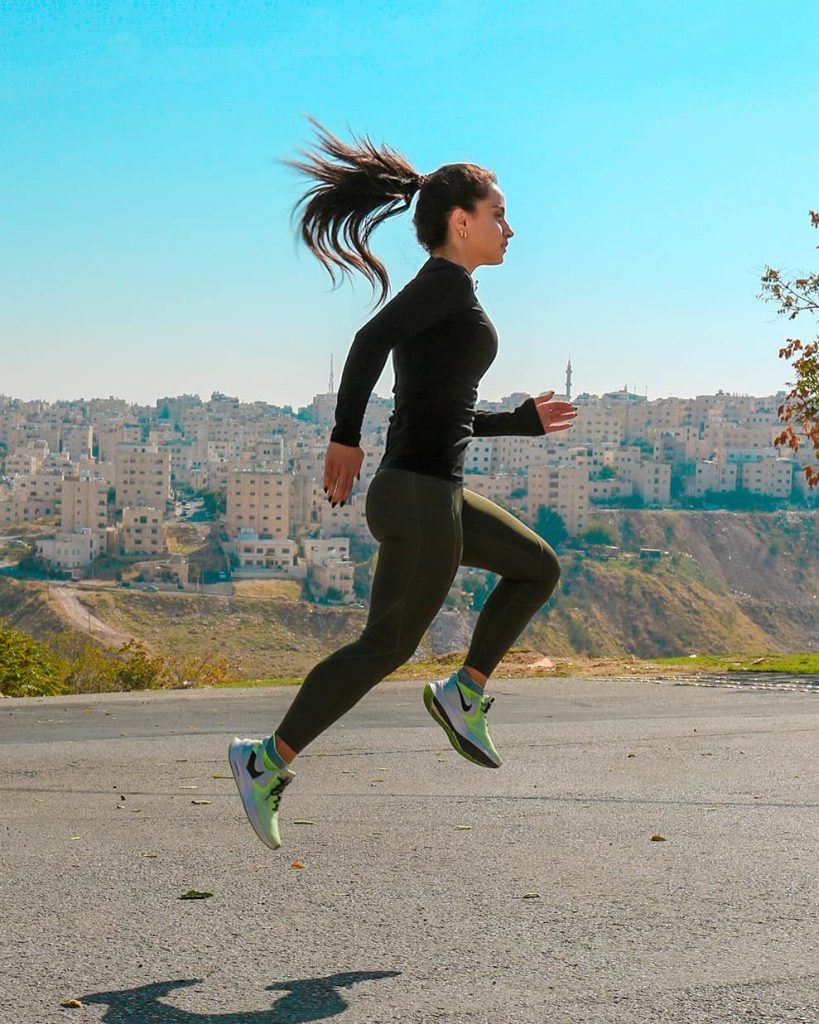Exercising while fasting can be a little tricky during Ramadan, you’re feeling tired, hangry, and more lazy than usual, but Jordanian fitness expert Rebecca Odeh fills us in on what you need to know if you *are* staying fit during the Holy Month.
Should we exercise before or after Iftar? Is it wise to push ourselves or not? Are there certain workouts we should steer away from?
Because of all these questions swirling around in our heads, some of us simply end up not working out and decide to put our body goals on hold for the entire month. You don’t need to sabotage your progress and fitness resolutions while fasting, so World Guinness Record holder Rebecca Odeh put those myths to rest for us once and for all.
What are some common myths about exercising during Ramadan?

Via Instagram @rebeccaodeh
A common myth is that you *shouldn’t* exercise at all during Ramadan, but Rebecca Odeh gave us the wake-up call we needed and told us that all these misconceptions are untrue.
“Your body is capable of completing a wide range of tasks, including exercise during Ramadan. The key is to find workouts and times that are right for you,” she said. “Try working out in the morning and evening to see which time and exercises suit your body the best. You are the only one who truly understands your body. So, depending on how energetic you are at the time, you can continue to mix up your workouts, the intensity of your exercises, and the times you workout throughout Ramadan. Even if you don’t have much energy, you can always reduce your reps and sets, lower the weight, increase your rest time, and slow down your cardio.”
Is there a certain preferred time of the day during Ramadan to exercise?
Rebecca Odeh let us know that there is actually no such thing as a preferred time to work out during Ramadan; every single one of us has different energy levels and preferences when it comes to what our ideal time for working out is.
“Let’s say you are trying to keep up with a fixed routine where you are reserving energy levels, losing fat, and building muscles,” she said. “Suppose your workout is mainly cardio and bodyweight training. You can either do it before Iftar or after a light Iftar (30-40 minutes) to help reduce body fat and weight training (preferably after Iftar) to aid in muscle building. However, If you’re a person who feels more sluggish after Iftar and if you have trouble sleeping after an evening of a heavy workout, try switching to fasted training before Iftar.”
What workouts would you recommend during Ramadan?
“It is essential to know that you should not start a new exercise regime during Ramadan; stick to your old routine as the purpose is to move and be active. I always tell my students that they should work out depending on how they feel if they are low or high on energy. Some people function better while fasting, surprisingly,” Rebecca Odeh said.
She also told us that if you’re focused on cardio, you should reduce the intensity of the workout. As for those weight training, you need to increase the reps, decrease the weights and allow yourself more resting time between the repetitions.

Via Instagram @rebeccaodeh
Do you have any tips & tricks for those that are exercising while fasting?
“First things first, you need to accept how your body acts as your energy levels may differ from one day to the other, listen to your body, accept the energy and adapt to it.”
Rebecca Odeh also advised to stay well hydrated and drink at least half a liter before eating to feel fuller quicker, it reduces the amount of caloric intake and dilutes excessive stomach acid.
Another tip she gave us was to get plenty of rest during the day and not try to compensate for lost calories by overeating at Suhoor.
Why do you think exercise is important during Ramadan?

Via Instagram @rebeccaodeh
Energy Boost
“Endorphin is a natural hormone produced by your body. This hormone makes you feel good and can aid in stress relief. It will also aid in the improvement of your energy levels. This is especially important during Ramadan when you have a fast-paced life and try to accomplish as many tasks as possible. You require more energy and less stress, which can be obtained through exercise.”
Enhanced Mental Functions
Your critical thinking skills and overall concentration can be improved by working out and staying active, according to Rebecca Odeh. Trying to focus for lengthy periods of time during Ramadan can be challenging, which may cause you to fall short of the goals you set for yourself before the month even began.
“This month, you should focus on improving your concentration, which you can do through physical activity. The workouts don’t have to be long; a quick 45-minute session will help you focus better and improve your mental functions. The exercises don’t have to be as harsh as usual, and they can be done at a slightly slower pace than expected.”
Rebecca Odeh informed us that many fitness experts fail to tell you that your body is unique and functions differently than anyone else’s. So, you should listen to your body and see how it reacts to specific workouts.
“Not every healthy habit works for all body types, and not every workout schedule that works for your best friend would work for you,” she said.
“Don’t get demotivated, and always remember, if you want to start, start today, don’t wait till the beginning of the week. And just as you like to be rewarded at work for a job well done, reward your body with food that you might be craving, and even indulge in that ice cream while binge-watching your favorite Ramadan series during the weekend.”

